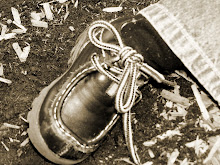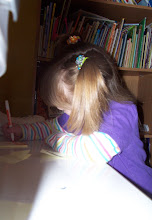When I knew him he was twelve years old and in the sixth grade, that awkward and glorious first year of middle school. He loved English class and was less enthusiastic about Mathematics, but diligent about completing his homework. He was a fan of college basketball, football, and track and field. Most afternoons he joined his friends at a local after school teen club where they played sports, checked out girls, and just "hung out". The TV was permanently set to MTV whenever he had any say about the matter. When given the chance he came home with a trombone to play in the middle school band and used his pencils as drums far too often. He was one cool kid.
She was three years old and the definition of independence. She wore only the clothes that she wanted to wear because the battles to try to convince her to wear anything else were far too great. She did everything on her terms and would refuse to cooperate with a direction to then do the exact same thing a minute later as long as no one told her to do so. At the age of three she was bilingual, working with a third language, and could easily switch between the languages based upon the situation and her needs. After being exposed to the book Brown Bear, Brown Bear for a week at school she took it to the reading corner and "read" it word for word from memory, turning the pages at the right times and adding dramatic flair. If she did not want to do something, there was little chance of changing her mind. She was shy around others but also a flirt with her smiles and waves and a chatterbox when she was at play. I lost debates with her frequently.
He is six years old and has the best sense of humor I have ever seen in a child. You have to be very careful what kind of jokes or comments are said around him because he picks them up and understands things that he is far too young to understand. He is a superflirt with the Kindergarten girls, and girls in general and has quite the fan club. He does not hesitate to make his opinion known and has his own opinion and view about almost everything. One of his favorite ways to amuse himself is to test every new adult he meets by trying to see exactly how far he can push them. He loves technology and working with computers. He also loves watching car races, Disney movies, and Pirates of the Carribean. He hates girly movies.
These are just three of the many children I have met and loved that have also happened to have mental retardation. They are not stupid or uncool, and they deserve more respect than to have to face a world where they are bombarded with the word "retarded" being thrown at them as a slang term for things that are uncool or displeasing or hated. They deserve acceptance, respect, dignity, and equality. They are kids who have more in common with their peers than they have differences. How long will it take us as a society to learn this fact?
Thursday, February 5, 2009
Sunday, February 1, 2009
Sticks and Stones
I know that this spring/summer there was a great deal of debate over the terminology used to refer to individuals with cognitive disabilities or delays due to the movie Tropic Thunder. I stayed out of that debate because I felt that based upon the quality of the movie, those who would pay attention to the debate would never have attended the movie to begin with and vice versa. However, I have noticed since that time that the word "retarded" has become a standard slang phrase amongst not just teenagers in middle and high school but far too many adults as well to refer to anything that they may find senseless, odd, or to their disliking. This horrifies me because this is a word with power. All words have power, but words that have been used to identify people, to segregate and isolate and dehumanize people are especially powerful. The word "retarded" has a long, dark history that includes institutionalizations, forced sterilizations, and eugenics. It is a heavy, weighted, sharp and cutting word and among probably the top powerful and historically weighted words in the English language. So why is it suddenly considered acceptable to take this word and throw it in the face of those for whom mental retardation is a medical reality? To mock it, to ridicule it, to turn it into an insult? Words have the ability to dehumanize, to disrespect, to rip apart people and to take a label that someone already has to bear and turn it into an insult, to ridicule it and make it a joke is beyond dehumanizing. It not only dehumanizes individuals with mental retardation but it dehumanizes those callous enough to believe it is appropriate to utilize the words in this manner. It reveales a depth of ignorance and supposed superiority that is astonishing. It reveals just how far we have not come since the days of eugenics and institutions.
Another powerful word is the word wheelchair. It sounds simple, until it is used in place of any other identifying feature and the person using the wheelchair is referred to as "a wheelchair" or "the wheelchair". This is dehumanizing and demeaning and disrespectful. Just because someone relies upon an alternate mode of ambulation does not mean that their mode of ambulation defines them; they are not "a wheelchair" anymore than someone who walks for ambulation is "sneakers". It turns a human being with thoughts, feelings, emotions, worth and value into nothing more than an object that is worth less and too often worthless. To define an entire life by its limitations instead of its humanity, its successes, its uniqueness is ignorant, is painful, is injustice by definition, and is unethical/immoral. No one wants to be defined by the areas in whic they struggle or by the differences that the world has not yet learned to value; everyone wants to be defined as a unique individual. To have words that may already be a burden become callous jokes or inappropriate summaries of your existence is unacceptable. Sticks and stones may break just bones, but words destroy the soul.
Another powerful word is the word wheelchair. It sounds simple, until it is used in place of any other identifying feature and the person using the wheelchair is referred to as "a wheelchair" or "the wheelchair". This is dehumanizing and demeaning and disrespectful. Just because someone relies upon an alternate mode of ambulation does not mean that their mode of ambulation defines them; they are not "a wheelchair" anymore than someone who walks for ambulation is "sneakers". It turns a human being with thoughts, feelings, emotions, worth and value into nothing more than an object that is worth less and too often worthless. To define an entire life by its limitations instead of its humanity, its successes, its uniqueness is ignorant, is painful, is injustice by definition, and is unethical/immoral. No one wants to be defined by the areas in whic they struggle or by the differences that the world has not yet learned to value; everyone wants to be defined as a unique individual. To have words that may already be a burden become callous jokes or inappropriate summaries of your existence is unacceptable. Sticks and stones may break just bones, but words destroy the soul.
Tuesday, January 20, 2009
Lessons Learned
I thought that I had a decent awareness and understanding of concepts like accessibility and inclusion, of not just tolerance but acceptance of individuals with disabilities in society as equals especially because of my experiences as a special education teacher and advocate for inclusionary practices in education. Perhaps my awareness and education about the subject was greater than average, but it was still so incomplete. This has become clear to me recently as I have found myself interacting with the world from the position of one requiring a wheelchair for mobility due to a still unexplained loss of muscle strength and change in muscle tone. I have discovered that accessibility is so much more than I would have ever imagined. There are so many subtle issues to being able to access a store or a building that I never considered, far beyond whether there are stairs or a ramp. Things like adequate aisle space, objects cluttering and blocking the aisles, the positioning of so many objects so far out of reach, and certain areas of stores being designed in such a way that it is impossible to access them in a wheelchair. It is also attitudes. I have been blatently stared at while out in public countless times, as if my humanity disappeared the minute I ceased to use my legs as my primary source of mobility. Then there is the constant assumption that because I am using a wheelchair to access the world, I must have surrendered a great portion of my intelligence as well. My heart breaks for how my kids must be treated in public, the stares and comments and the lack of dignity when they are spoken to and how desperately they must long for a way to communicate the message that they are still kids and to get over it. I have to rely upon publc transportation right now, since my vehicle is still hundreds of miles away and I do not think I would be permitted to drive anyway, and this too has been a startling experience. It has been engrained into my being that all people are people first and then they may happen to be people with a disability, but apparently few people in the world recognize this. I have been referred to as "a wheelchair" more times than I can count. I am not a wheelchair anymore than someone who walks is sneakers - my method of mobility does not define me- yet how often this happens to my kids breaks my heart. They are automatically defined not by their unique personality, not by the fact that they are children, but by their diagnoses and disabilities. For convenience, for ignorance, for prejudice, for simple labels they are reduced to that with which they struggle instead of all that is so gloriously right and perfect and beautiful and incredible about them. My first year teaching I heard my assistant refer to my children who were non-ambulatory as "wheelchairs" and gently, but firmly explained that I would not tolerate such language never expecting to hear it again. I am saddened that so much ignorance remains and to know that this is the world my kids are up against. Yet I am all the more proud of them for their spirits, for their determination, and for their families who are unwilling to conform to the definitions provided by the world for their children or themselves. Right now seems like a very difficult time in my life as I am having to fight so hard to regain all that I have lost, but I have also gained so very much. I have gained such incredible insight and awareness of the world faced by my kids and their families that I could have never known without living it myself, and I will treasure the wisdom and appreciation from this journey that has changed my heart forever. If anything this will have made me a more dedicated, passionate, compassionate, aware, and advocate teacher.
Subscribe to:
Posts (Atom)





